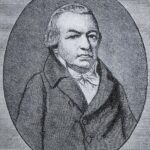This is a biography of Ludwig van Beethoven the elder, grandfather of the famous composer, who was named after his grandpa. Both were talented musicians, but the grandchild is the one, who became a wonder of the World.
The first documented Ludwig van Beethoven was born in 1712 in the town of Malines, or Mechelen, duchy of Brabant. This is modern day Belgium, the family was Flemish.
We do not know much about this family. We know that his father was a baker by profession, who later started a business in luxury goods, which turned out to be a huge success. The Beethovens in the area usually were entrepreneurs, such as traders or inn-keepers. The family had four children, only two survived: Ludwig (or Louis, or Lodewyck, or Ludovicus) and Cornelius.
|Related: What does Beethoven’s name mean?
This elder Ludwig van Beethoven was baptized at St. Katherine’s Church, January 5, 1712. Church and music dominated his early life. He becomes a choir boy at the age of 5 at the cathedral of St. Rombaut. He was late to keyboard music, he started his lessons at the age of 13, on organ. Testament to his talents is his next career promotion. At age 19, beside being a singer at St. Peter in Louvain, he was promoted to substitute Kapellmeister (music director) position, as well. In the coming years his voice brought him to Liége and St. Lambert. Most probably this is where Clemens August, Archbishop Elector of Cologne, heard the young man and decides to win him over for Bonn and his Court.
In 1733 Ludwig van Beethoven the elder, moves to Bonn to work for Clemens August. A brilliant career move, as history will prove him: he would serve under two Electors for the coming forty years, being a fine bass singer, a star on the opera stage, and a fine keyboard player.
Later this year (September, 1733) he marries a local family’s daughter, Maria Josepha Poll. By establishing his family the door opened for the next generation, eventually to an even more important Ludwig van Beethoven!
Clemens August’s era was a golden one. The city and the Court flourished, art was everywhere. This grandeur, however, unfortunately was financed by debt, on money mostly borrowed from France. When August died the city was almost bankrupt.
His successor Maximilian Friedrich took over in 1761. The new regime had to consolidate and cut back expenses, partly on Court musicians. The incumbent Kapellmeister Touchemoulin resigned leaving an open seat behind. Beethoven saw his chance and went for it! His petition had been accepted and Ludwig van Beethoven the elder became Kapellmeister for many years to come.
A Kapellmeister had many duties: directing the chorus, the orchestra, supplying new music material and performances, also setting general direction to music, as art. Managing the musicians, hiring and other human resources related tasks were part of the job description. Ludwig also kept his position as singer, which was highly unusual. When he had started in Bonn as singer he earned 400 florins a year, with the new Kapellmeister position his salary almost doubled.
Ludwig inherited good sense in business. He started his own wine trading, buying local Rhine wine and shipping it back to his home, Brabant. He sold wine also locally, operated two cellars at the same time. Later, when the capital was available, he kept an extra apartment for renting and started lending money to locals.
The great success in his career and his businesses were shadowed by disaster at home. His wife became alcoholic beyond hope and she was institutionalized in a cloister, a contemporary therapy home. They had three children, only one survived: Johann, their last one.
Johann van Beethoven was born around 1740. It was customary of the time that children were taken out of school early and trained in the family trade or business. Johann soon was thought how to deal with wine (something later destroyed his life), also singing and playing keyboard. In 1752 the boy had entered the choir, kept singing for more than a decade – for free. It was only from 1764, when he started getting a salary of 150 florins.
Relationship between father and son was far from ideal. Johann was more blessed with constant urge to wander and less with musical talent. Probably their biggest break came, when Johann found love and proposed to a woman called Maria Magdalena Keverich, a young widow. Ludwig was against the relationship all the way and was ready not to attend the wedding “unless it is short and held in Bonn”. He regarded Maria unworthy to his son, saying “I would never have thought that of you, never expected you would stoop so low!”.
Neighbors remembered Beethoven the elder as “a very respectable man in his dealings, a good hearted man”, another family friend described him as “bull of vitality, a picture of strength”. In general he was a forceful and independent person, a stubborn man and sometimes violent in temper. These are personality traits easily identifiable in his famous grandson.
In 1773, just one day before Christmas, Ludwig van Beethoven the elder, the Kapellmeister of Bonn, suffered a stroke and died.
Beethoven (the younger) always remembered his grandfather as a kind and loving person. He lost him at the age of three. Beside the tender memories, Beethoven was proud owner of a painting of his grandfather, something he always kept in his room. This was the creation of Amelius Radoux, a sculptor and wood-carver – probably his only painting he ever made. Looking upon his grandfather’s picture he always told stories about him and proudly pointed out the similarities in their appearance.











